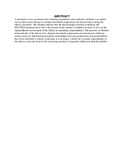| dc.contributor.author | Muga, Geoffrey O | |
| dc.contributor.author | Onyango-Ouma, Washington | |
| dc.date.accessioned | 2013-06-23T09:05:00Z | |
| dc.date.available | 2013-06-23T09:05:00Z | |
| dc.date.issued | 2009 | |
| dc.identifier.citation | Journal of Cross-Cultural Gerontology September 2009, Volume 24, Issue 3, pp 259-272 | en |
| dc.identifier.issn | 1573-0719 | |
| dc.identifier.uri | http://link.springer.com/article/10.1007/s10823-008-9090-6 | |
| dc.identifier.uri | http://erepository.uonbi.ac.ke:8080/xmlui/handle/123456789/38432 | |
| dc.description.abstract | A descriptive cross-sectional study including quantitative and qualitative methods was carried out in rural western Kenya to examine household composition and food security among the elderly caretakers. The findings indicate that the deteriorating economic conditions and HIV/AIDS pandemic have led to the increase in the number of children in need of care and the unprecedented involvement of the elderly in caretaking responsibilities. The presence of children in households of the elderly have changed household composition and introduced a different social context in which intergenerational relationships between grandparents and grandchildren have been redefined. Contrary to the past, it is no longer a desire but a routine responsibility of the elderly to provide food for the increasing number of dependant children in their households. | en |
| dc.language.iso | en | en |
| dc.publisher | Springer US | en |
| dc.subject | Elderly | en |
| dc.subject | Food security | en |
| dc.subject | Household composition | en |
| dc.subject | Orphans | en |
| dc.subject | Kenya | en |
| dc.title | Changing Household Composition and Food Security among the Elderly Caretakers in Rural Western Kenya | en |
| dc.type | Article | en |
| local.publisher | Institute of Anthropology, Gender and African Studies, University of Nairobi | en |


